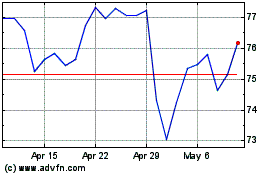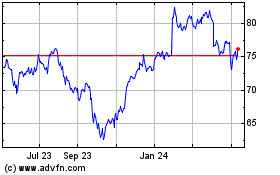Sysco Names Nelson Peltz, Josh Frank of Trian to Board -- Update
August 20 2015 - 7:17PM
Dow Jones News
By Annie Gasparro and David Benoit
Sysco Corp. agreed to add Nelson Peltz and Josh Frank of Trian
Fund Management LP to its board less than a week after the
investment fund disclosed a 7% stake in the food distributor, an
unusually fast agreement that reflects activist investors' growing
clout with public companies.
Sysco, which delivers food and supplies to restaurants and
hospitals, faces pressure to bolster profit margins and hone a new
strategy in the wake of its failed attempt to acquire rival US
Foods Inc.
The move to expand Sysco's board to 12 members comes after
Trian--led by Mr. Peltz, its chief executive and co-founder--said
last week that Sysco hadn't lived up to its potential and should
run itself more efficiently. Trian, which became Sysco's largest
shareholder through its investment, also said Sysco should better
align management's compensation with the company's performance.
"We have engaged in constructive dialogue with Nelson and Josh
and look forward to benefiting from their insights and
contributions," Sysco's nonexecutive chairman, Jackie Ward, said in
a statement Thursday.
The accord marks one of the more rapid examples of activists
gaining board seats without a public battle, a sign of their
increasing influence among companies and other shareholders. Last
year, activists gained board seats at a record 107 companies, 91 of
them through pacts negotiated with the companies, according to data
provider FactSet. This year has gotten off to an even faster start,
with activists gaining seats at 86 companies in the first half
alone.
Trian long has exercised its muscle as among the most successful
activist firms in securing board seats. The roughly $12 billion New
York fund believes gaining those seats is the best way it can help
companies it invests in.
"Sysco is a leader in its business, and we believe it is
undervalued and has tremendous long-term potential," Mr. Peltz said
Thursday.
Houston-based Sysco, the largest U.S. food distributor by sales,
had touted its planned $3.5 billion acquisition of US Foods as a
way to cut costs and run a larger, more efficient operation. The
merger was in the works for about 18 months before Sysco dropped it
in June after a federal judge issued a preliminary injunction to
block the deal on antitrust grounds.
Sysco's operating profit margin has declined for the past
several years, as local, specialty distributors and wholesale
stores, such as Restaurant Depot, attract smaller restaurant
customers, which are typically more profitable for Sysco than
national chains. Meanwhile, sluggish U.S. restaurant sales overall
have pinched Sysco's revenues.
Trian's partners are no strangers to the food industry, a
specialty of the 73-year-old Mr. Peltz. Trian's first investment,
in 2005, was in Wendy's Co., where Mr. Peltz remains chairman. He
also serves on the board of snacks giant Mondelez International
Inc.
Mr. Frank, a younger partner at the firm at 36, has been
involved in many of Trian's consumer-goods investments.
Sysco has scheduled an investor conference for Sept. 15, when it
plans to discuss its plans for cost-cutting, smaller acquisitions,
and improving its technology and product assortment. Chief
Executive Bill DeLaney reiterated on Thursday that the company
plans to repurchase $3 billion more of its shares over the next two
years. Over the past three years, the company has cut $750 million
in annual costs, he has said.
Josh Beckerman contributed to this article.
Write to Josh Beckerman at josh.beckerman@wsj.com
Subscribe to WSJ: http://online.wsj.com?mod=djnwires
(END) Dow Jones Newswires
August 20, 2015 19:02 ET (23:02 GMT)
Copyright (c) 2015 Dow Jones & Company, Inc.
Sysco (NYSE:SYY)
Historical Stock Chart
From Mar 2024 to Apr 2024

Sysco (NYSE:SYY)
Historical Stock Chart
From Apr 2023 to Apr 2024
